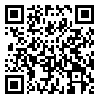مجله رویش روانشناسی از دادن گواهیهای کاغذی معذور است. لطفا تقاضا نکنید. همه گواهی ها در صفحه شخصی کاربران موجود است.
year 8, Issue 10 (Winter 2019/2020 2019)
Rooyesh 2019, 8(10): 181-188 |
Back to browse issues page
Download citation:
BibTeX | RIS | EndNote | Medlars | ProCite | Reference Manager | RefWorks
Send citation to:



BibTeX | RIS | EndNote | Medlars | ProCite | Reference Manager | RefWorks
Send citation to:
Tajipoor A, Abbasi Motlagh F. (2019). The Effect of Behavioral Activation Therapy on Coping Strategies in Students with Generalized Anxiety Disorder. Rooyesh. 8(10), 181-188.
URL: http://frooyesh.ir/article-1-1611-en.html
URL: http://frooyesh.ir/article-1-1611-en.html
1- M. A of Science in Clinical Psychology, Boroujerd Islamic Azad University, Lorestan, Iran , amenehtajipoor@gmail.com
2- B. A of Clinical Psychologist, Hekmat Razavi Institute, Lorestan, Iran.
2- B. A of Clinical Psychologist, Hekmat Razavi Institute, Lorestan, Iran.
Abstract: (2697 Views)
The purpose of this study was to investigate the effect of behavioral activation therapy on coping strategies in students with general anxiety disorder. The research method was semi-experimental with pretest-posttest with the control group. A total of 30 undergraduate and undergraduate female students from Khorramabad University were selected based on criteria of the research and randomly assigned to the experimental and control groups. The experimental group received eight sessions of 90 minutes (weekly twice) of the program of behavioral activation group therapy; the control group was placed on the waiting list. Data were collected in pre-test and post-test by Lazarus & Folkman coping strategies questionnaire. Data were analyzed using one-way covariance analysis. The findings of the research showed that there is a significant difference between the mean scores of post-test of the test groups and the control group in controlling the effect of the pretest, in the components of coping strategies. According to the findings of the research, it can be stated that behavioral activation therapy has a significant effect on increasing the problem-oriented coping strategies and reducing the emotional coping strategies. In general, it is suggested that behavioral activation group therapy be considered as an excellent way to improve the methods of coping of students with a generalized anxiety disorder, by counselors and psychotherapists.
Type of Article: Research |
Subject:
General Psychology
Received: 2019/04/2 | Accepted: 2019/05/8 | ePublished: 2019/12/31
Received: 2019/04/2 | Accepted: 2019/05/8 | ePublished: 2019/12/31
Send email to the article author
| Rights and permissions | |
 |
This work is licensed under a Creative Commons Attribution-NonCommercial 4.0 International License. |






